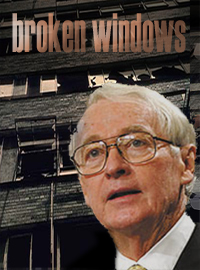| James Q. Wilson, Blue Collar Intellectual |
 |
|
By Ashton Ellis
Wednesday, March 07 2012 |
An important new book helps explain why the recent death of James Q. Wilson is a hard blow to America’s experiment with enlightened democracy. In Blue Collar Intellectuals: When the Enlightened and the Everyman Elevated America, author Daniel J. Flynn profiles six Americans who used their exceptional learning to educate the masses. Flynn’s narrative explains how historians Will and Ariel Durant, philosophers Mortimer Adler and Eric Hoffer, economist Milton Friedman and novelist Ray Bradbury went around the academic and media establishments of their day to make important ideas accessible to intelligent lay people. In his way, so too did James Q. Wilson. The list of Wilson’s achievements is long. After earning a PhD at the University of Chicago he taught for twenty-five years at Harvard, serving on presidential commissions and publishing numerous influential books and articles. He served as the President of the American Political Science Association, and in 1990 received the APSA’s highest honor, the James Madison Award. But Wilson’s greatest accomplishment may well have been spurning the professor’s temptation to answer questions no one cares about for the benefit of no one in particular. By contrast, Wilson’s professional reputation was marked by a deep concern with translating his rigorous academic scholarship into ideas accessible to an intelligent lay person. This made him one of the few political scientists concerned with making his work actually useful to everyday Americans. In his APSA acceptance speech Wilson warned his fellow academics of the irrelevancy they courted if with their theories and prejudices they could not offer basic answers to important questions. “What would the intelligent lay person make of a political science profession that can explain the outcomes of elections but not why people vote; can explain the influence of large associations but not why people join them; can explain the struggle for material advantage but not that for ethnic advancement, religious salvation, or public morality; can explain the distribution of regulatory benefits to powerful clients but not the withdrawal of those benefits by means of deregulation?” Wilson knew of what he spoke. His most enduring contribution to social science was a series of publications on the direct relationship between a high crime rate and the lack of adequate punishment. Raise the cost of doing crime and crime will go down. While those truths may seem self-evident, they were shocking to the academic establishment that argued (and still argues) that the root causes of crime are poverty and racial discrimination. Wilson’s insights into human nature swam against the tsunami of greater government spending unleashed by the Great Society. But for two anti-establishment characteristics of Wilson’s work, America might not have heard of his minority views. The first characteristic was his ability to articulate problems and solutions in ways that intelligent lay people could understand. In the crime sphere, the cohort most benefited by Wilson’s work was street-level cops. Those were the men and women for whom Wilson’s “Broken Windows” theory of crime – that rundown neighborhoods look unsecure and therefore attract criminal activity – provided a readymade remedy. Increase police patrols that build relationships with community members and criminals will stay away. Another aspect of Wilson’s scholarly output is that it was not confined to university presses and scholarly journals. To be sure, Wilson was a regular in such pages, but his greatest influence came whenever he placed the fruits of his labors in magazines like Atlantic, Public Interest and City Journal. Wilson’s ability to translate statistical inferences into the popular media also enabled him to publish important books such as Thinking About Crime, Bureaucracy, The Moral Sense and The Marriage Problem with publishers that made his ideas accessible to millions more readers than would be reachable by the standard academic press. Every year social scientists churn out a glut of research with little practical value while American citizens and policymakers are starving for useful information. While no one should fancy himself the reincarnation of James Q. Wilson, it would be a healthy exercise for the scholarly community to consider how much of its work this year will improve the quality of life – even the life of the mind – for other people next year. Like the people Flynn profiles in his book, James Q. Wilson made his most lasting mark educating everyday Americans. If Flynn ever publishes an updated volume of Blue Collar Intellectuals he should include Wilson as an entry. No doubt the man deserves it. |
Related Articles : |
























